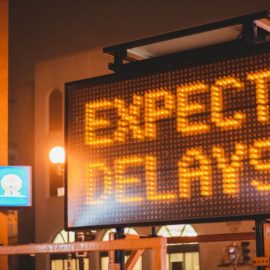

This article is an excerpt from the Shortform book guide to "The Big Leap" by Gay Hendricks. Shortform has the world's best summaries and analyses of books you should be reading.
Like this article? Sign up for a free trial here .
What’s preventing you from achieving your highest potential? Do you hold any beliefs that are holding you back from living the life of your dreams?
To achieve our full potential, we need to overcome our “happiness threshold” (the maximum amount of happiness we allow ourselves to experience). Once you begin nearing your happiness threshold, you become uncomfortable and unconsciously sabotage yourself so you can come back to a comfortable baseline. Overcoming self-limiting beliefs that make up your happiness threshold is the first step to embarking on a life path of happiness, success, and fulfillment.
Here’s how to overcome self-limiting beliefs.
The False Beliefs That Hold Us Back
According to Hendricks, our happiness threshold is set early in our lives by having false beliefs ingrained in us that cause feelings of fear, unworthiness, or guilt when we achieve success. He identifies some common false beliefs, and gives examples of how we might end up internalizing those. He says everyone holds at least one of these false beliefs, and some more than one. The first step toward transcending your happiness threshold and overcoming self-limiting beliefs is doing some self-examination to identify which of these you hold and where it came from.
(Shortform note: Limitless by Jim Kwik discusses how to overcome self-limiting beliefs about learning. He argues that we impose limitations on ourselves through false beliefs about our intelligence that we likely learned when we were young.)
False Belief #1: “I am flawed at my core, so I can’t also be successful.”
According to Hendricks, this belief likely originates in some experience of rejection that you felt you were to blame for, or from being criticized often. Perhaps you came to believe you were at fault for your parents’ divorce, or you had a parent who was relentlessly hyper-critical of you. You may have come to accept these perceived failings or flaws as an innate part of your identity.
When you believe you’re fundamentally flawed, and you start to achieve success in life, this creates a situation where you’re trying to hold conflicting beliefs. This puts you in a state of cognitive dissonance, which psychology tells us is uncomfortable to maintain, so you’ll feel compelled to resolve that discomfort. To resolve it, you may engage subconsciously in this line of reasoning:
- I can’t be both flawed and successful.
- Therefore one of those can’t be true.
- But I am flawed (this belief is deeply rooted).
- So, therefore I mustn’t be successful.
- Hence, I must keep myself from success (self-sabotage).
False Belief #2: “My success would be a betrayal of my roots.”
This belief is formed by a mismatch between your type or degree of success and what has been expected of you. Many parents have preconceived ideas about a career path for their children. If your parents were both highly educated professionals, for example, they may have pushed you to excel in academics, in hopes that you’d follow in their footsteps. If you were drawn to pursue a career in the entertainment industry, no matter how successful you are in that field, you may feel like you’ve let your parents down. Hendricks explains that when you achieve success in a way that diverges from the expectations of others, it can feel uncomfortable, as if you’re betraying your loved ones. You may feel like you’re leaving your family behind or crushing their hopes. The guilt that results may cause you to self-sabotage to ensure that doesn’t happen.
(Shortform note: Class consciousness can also contribute to a strong sense of betraying our roots. Karl Marx described the working class identity as being defined specifically in opposition to the wealthy elite. While we’re undoubtedly familiar with envy and admiration of the wealthy by the poorer classes, there’s also a long history of hatred of the rich. Many working class people are raised with negative views of wealth and wealthy people, along with a pride in their working-class identity. This could also create a situation where, for people from such backgrounds, any degree of material wealth could feel like a betrayal of your “roots.”)
False Belief #3: “My success would hurt someone else.”
Hendricks identifies a few ways in which we could imagine that our success would have a negative impact on others. If you hold this type of false belief, you may feel guilty when you have great achievements, and your self-sabotage will be a means of protecting those you believe are being harmed by your success. One variant of this is a belief that you were a burden, likely on your parents. If you fundamentally believe you’ve been a burden in your life, you’ll believe that your own success will only further burden others, because anything you produce is an extension of you.
Another variant of this is a belief that your success is casting a shadow on someone else. Hendricks points out that this one is common among children who were gifted, and thus consistently outperformed others, for example their siblings or classmates. Often such children are made to feel badly about it, by their parents, teachers, or resentful siblings or peers.
If you’ve experienced this, you may have an underlying fear of resentment from others if you outperform them, so your success makes you feel guilty, and you feel like you need to “tone it down” so you’re not in the spotlight. Hendricks points out that this could mean limiting your degree of success through sabotage, or not actually being able to enjoy success if you achieve it.
False Belief #4: “Great success ends in great ruin.”
This false belief, Hendricks suggests, may stem from stories we’ve been told about someone who was destroyed by their own success. Think about any family stories you may have heard that associate success with something negative, for example a relative who won the lottery and was ruined by it, or an ancestor who experienced a tragic fall from grace. Consider whether you may be reenacting any such story unconsciously. If this is the case, Hendricks proposes that you remind yourself that it’s not your story, and intentionally create a new story for yourself. This will involve envisioning your state of fulfillment, which we’ll discuss in the next section
(Shortform note: Hendricks mentions family stories here, but it may not be all that common for families to have stories of specific ancestors like this. What is common and pervasive, though, are our cultural stories. The kinds of stories he describes are commonly occurring tropes in movies and television—for example, movies where having or pursuing wealth ruins someone, or those centered on a “rich villain” character.)

———End of Preview———
Like what you just read? Read the rest of the world's best book summary and analysis of Gay Hendricks's "The Big Leap" at Shortform .
Here's what you'll find in our full The Big Leap summary :
- How to overcome the psychological barriers to success and fulfillment
- Why most people have a self-imposed limit to happiness
- How to identify your own false beliefs and stop self-sabotaging






